The practice of working on Convivencia at the Tutnpike
After weeks of speaking to many people who work and live on Turnpike Lane, we have chosen ten people to feature in this project. These were people who have found it easy to talk to us, were prepared to tell us about their life, and had interesting points to make about life on the Lane. We also tried to select a cross-cut of the population od the road, and a range of ages and experience. We would have liked more women to be included, but the social traditions of the palces where most of them come from, make it much more difficult for them to agree to such exposure. Some agreed but then were persuaded to pull out.
The ten people below were the ones who are included in the film we made, Convivencia at the Turnpike, and in the exhibition at dis/placed, in June 2015 at the Ditch, in Shoredich Town Hall, curated and organised by Counterpoint Arts. We are grateful to the director of Counterpoint Arts for this opportunity to show the material.
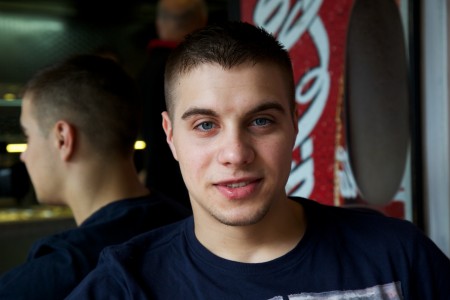 Andei Popa: I am Andre from Romania, I came to London in 2015. It was better in France, where I was for three years. People are not strange like they are here. Streets here are not clean. It is cleaner in France. It is nicer in France. People are very kind in France. [Is it because you are new?] No, after 4 months I do not think I am new. I work with costumers every day, I see the people, I talk to them. I see how they think. Here they come from many countries – it is mixed. [There must be something good about this?] Yes, maybe, I don’t know. Maybe parks are better here or nicer, I don’t know. It is bad here, weather, it is very very bad. You have one day off, you walk and it starts to rain. After 10 minutes too much sun. In Romania it is hot. You can’t breathe. It is 40 degrees. People love sunshine, more than here. I have a girlfriend from Romania. She visited a month ago. Stayed 10 days. When she finishes university she is going to come back. I ‘ve been with her in central London. [did she like it?] So so. She thought the people, the streets are dirty. It’s like in Romania – the streets are dirty. I want to go back to Romania, yes, after I have saved more money here. To open something a business like that, don’t know what yet. Something different. Not like everybody. My parents are still in Romania. They didn’t come here. I live upstairs, above the shop. I know many people in Turnpike Lane. Everyone knows me from the Kebab shop. When I pass them in the street they say, ‘where do I know you from, from this Kebab shop in Turnpike Lane?’.
Andei Popa: I am Andre from Romania, I came to London in 2015. It was better in France, where I was for three years. People are not strange like they are here. Streets here are not clean. It is cleaner in France. It is nicer in France. People are very kind in France. [Is it because you are new?] No, after 4 months I do not think I am new. I work with costumers every day, I see the people, I talk to them. I see how they think. Here they come from many countries – it is mixed. [There must be something good about this?] Yes, maybe, I don’t know. Maybe parks are better here or nicer, I don’t know. It is bad here, weather, it is very very bad. You have one day off, you walk and it starts to rain. After 10 minutes too much sun. In Romania it is hot. You can’t breathe. It is 40 degrees. People love sunshine, more than here. I have a girlfriend from Romania. She visited a month ago. Stayed 10 days. When she finishes university she is going to come back. I ‘ve been with her in central London. [did she like it?] So so. She thought the people, the streets are dirty. It’s like in Romania – the streets are dirty. I want to go back to Romania, yes, after I have saved more money here. To open something a business like that, don’t know what yet. Something different. Not like everybody. My parents are still in Romania. They didn’t come here. I live upstairs, above the shop. I know many people in Turnpike Lane. Everyone knows me from the Kebab shop. When I pass them in the street they say, ‘where do I know you from, from this Kebab shop in Turnpike Lane?’.
At home I worked like an electrician. But here I need too many documents, to work as an electrician. If I spend this time, it means losing time. I did not come to London to lose time; Time is precious. In London, too many kinds of people. You cross the street someone is speaking Kurdish, another Bulgarian. Too many people have come here. I don’t like it. In France it was not as mixed as here. Too many Turkish people. Too many Bulgarians and Romanian… in France it’s not the same. I speak little French. I spoke some English before. In Romania, English is the first foreign language and French second, but I hated French. When I arrived in France I could not say hello. After that it became easier to learn.
My dream is to finish going from place to place, France, London. Just go back to my country, have a house, have a family; To stay and not have too much stress. Stay relaxed. This is my dream. I do not dream like some people to have a plane or a Ferrari – I don’t want it. That is my big dream.
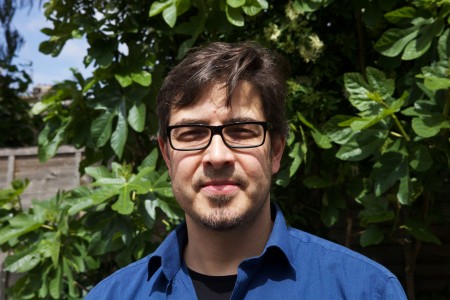 Andrei Gurvitz: I am Andrei and I came from Brazil in 2004. I love London. What impressed me was the diversity of people. The large number of languages spoken in the city. The cosmopolitan nature of the city; lots of people coming from all round the world. Different languages and also cultures and food. You have food absolutely from everywhere. The diversity of food. I love to cook. Try from Turkish to Indonesian, Asian, Chinese products and food. That is what really impressed me. I like to try foods I never tried before. It is now easy to also find Brazilian food. There are lots of Restaurants. Few Brazilian markets. You can find everything you need. Including Chimarraon (Mate tea), which you can find In London or Brighton. Everyone who comes to London I tell them – if you don’t find what you are looking for in London, it does not exist.
Andrei Gurvitz: I am Andrei and I came from Brazil in 2004. I love London. What impressed me was the diversity of people. The large number of languages spoken in the city. The cosmopolitan nature of the city; lots of people coming from all round the world. Different languages and also cultures and food. You have food absolutely from everywhere. The diversity of food. I love to cook. Try from Turkish to Indonesian, Asian, Chinese products and food. That is what really impressed me. I like to try foods I never tried before. It is now easy to also find Brazilian food. There are lots of Restaurants. Few Brazilian markets. You can find everything you need. Including Chimarraon (Mate tea), which you can find In London or Brighton. Everyone who comes to London I tell them – if you don’t find what you are looking for in London, it does not exist.
Before I lived in Bounds Green, which was more British before, it did not have so many foreigners living there. In the last 10 years I noticed a lot of people came form abroad to live in this area. We start seeing little Polish shops which we did not see in 2004. Lots of Hungarian shops we never had in 2004. People have their family and business and want to receive everyone.
I have just moved to Seven Sisters area, but have been living in this area for 10 years. In Turnpike Lane I only worked for the last 6 months, not very long, but Wood Green is my area of shopping – The diversity is incredible. You have a Turkish shop near an Asian shop, near a Polish shop. I am looking for a Brazilian shop nearby… I have never experienced direct racism: a little bit of indirect racism, through economics and areas. You see some areas getting less attention than others; Probably through politics or economics, but not direct racism. No, I never witnessed anything. It is very easy to live in this country.
One thing that impressed me here in UK is that if you obey the laws, you are able to live in peace with everyone, and you are out of trouble. The moment you break the law, they will find you – I think that is impressive. I miss Brazil in the sense of friends and family and the natural beauty. Food is cheap there, because we are a primary producer. I don’t miss Brazil in terms of violence, freedom of speech, acceptance and impunity. I do not plan to go back to Brazil soon, but I feel I have to go back to Brazil one day. I think if I have a kid, which I plan to have in the future, I think he needs to live a Brazilian life for a while, but I feel a lot like a British person. A lot in the way that the system operates; asking you to take responsibilities, citizen rights.
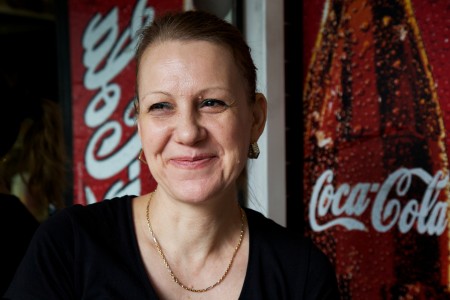 Anie Gecheva: I am Anie from Bulgaria, I came here in 2007. Before [Working in] this Kebab shop I worked in a hotel for three years but did not like it; cleaning rooms and all that; this is better. My colleague Andrei, he is from Romania. The first time I came here, I liked it, and I live in Turnpike Lane and like my job. I like Bulgaria more than London. But here I work for money and I feel better, because I can spend more. Economics in Bulgaria is very bad. My son is 23 years old. He is working here. He is a Londoner and he does not think of going back to Bulgaria. He likes it here. My sister and her family are here. Everybody is here. Just my mother and father are in Bulgaria. I go to see them twice a year. My mother comes here every year. She likes it very much. [Do you think of going back to Bulgaria] No, no. At the moment I live here. I don’t want to return. I just go for holiday.
Anie Gecheva: I am Anie from Bulgaria, I came here in 2007. Before [Working in] this Kebab shop I worked in a hotel for three years but did not like it; cleaning rooms and all that; this is better. My colleague Andrei, he is from Romania. The first time I came here, I liked it, and I live in Turnpike Lane and like my job. I like Bulgaria more than London. But here I work for money and I feel better, because I can spend more. Economics in Bulgaria is very bad. My son is 23 years old. He is working here. He is a Londoner and he does not think of going back to Bulgaria. He likes it here. My sister and her family are here. Everybody is here. Just my mother and father are in Bulgaria. I go to see them twice a year. My mother comes here every year. She likes it very much. [Do you think of going back to Bulgaria] No, no. At the moment I live here. I don’t want to return. I just go for holiday.
It is strange in Turnpike Lane… there are many different people. I like it – it is interesting. Now I know many people from many countries and I have more friends – it is better like this. Many friends from this street. [My Dream?] I wish to set up a coffee shop one day. Make some business. This business is my boyfriend’s. I help him, I work here. My boyfriend is from Turkey. In this shop there are people from everywhere – From Bulgaria, Romania and Turkey.
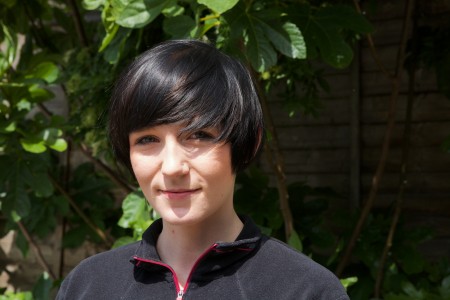 Jaymee-Lee Taspell: I am Jaymee Lee, from Essex. I’m going to Goldsmith [College]. And because I dropped out of College when I was 17, I have to do four years rather than the standard three… I have been working in Turnpike Lane since January. I like it; you get really good food, and its really cheap, so it’s nice for your lunch and stuff from work… We do get regular customers coming in, which I start to recognise, good characters of people, good mix of characters.
Jaymee-Lee Taspell: I am Jaymee Lee, from Essex. I’m going to Goldsmith [College]. And because I dropped out of College when I was 17, I have to do four years rather than the standard three… I have been working in Turnpike Lane since January. I like it; you get really good food, and its really cheap, so it’s nice for your lunch and stuff from work… We do get regular customers coming in, which I start to recognise, good characters of people, good mix of characters.
Where I am from in Essex is really a small workers town, so it is a lot like this, there are a lot of cultures around… I wouldn’t say it’s any different. I now live in Leyton, I just work here, so it’s about the difference I see between here and Leyton, which is quite big.
In the shop we have Kate, from the North of England, so we have this North-South thing going on, there is a big African community coming to the shop, also a big Italian community, always a lot of people, different accents, difficult to understand sometimes… I think its really good… I don’t think communities can work unless people can learn from each other… like, the way that I am, all my friends are from different countries, so I make sure that I can intermingle with people that aren’t the same as me… which I think is a good thing, which makes you a better person.
I haven’t noticed many changes here… when I first arrived, because it was winter, kids were hanging around the street corners, but that has stopped now that its summer… All my friends are from different countries. I think it’s really important, especially with people my age, that you start to mix with different cultures. It makes your life more fulfilled, you get to learn more things, rather than just having a set mindset. You get introduced to different foods, music… it just feels good… and you get free holidays away from home with their families… I’ve got Indian friends, Australian friends, Italian friends, French friends, Belgian friends – friends from everywhere. I get cooking lessons, Italian lessons – yeah, it’s really good, because, like a lot of my Italian friends, they want me to teach them how to speak cockney… […] so I teach them cockney and they teach me Italian.
[Diversity – something to celebrate?] Definitely! I don’t see why anyone wouldn’t think that! [But a lot of people who don’t agree with you] Yeah, but, you know, it makes my life happy to agree! Well, where I am from in Essex, near Tilbury Port, a big port town, and when the ships started docking into the port, there was a fear of the unknown person, like I have not really seen anyone of colour before, like a black person, or Indian man, it was like ‘they are strangers, so they are not safe’, that’s where a lot of this attitude came from, like not speaking to people who are not the same as you, basically.
My Mom always had a liberal approach, and so has my Dad, its more my grandparents that had that sort of view; yeah, my Mom, she grew up in the 1980s and was a bit of a Mod, she rebelled, she was sort of ‘I’ve got my own views, so leave me alone’. [You get on with your grandparents?] Yeah, sure… but when you are talking to them, you have to remember not to… they come from a different time… so not to be upset by the things that they say!
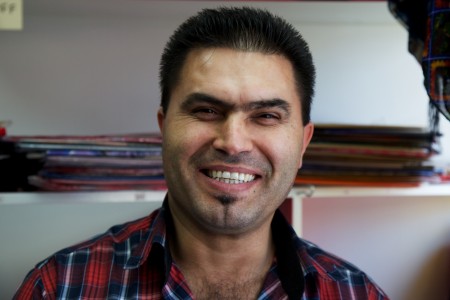 Nafiz Kaya: I Arrived from Turkey in 1994. Until the age of 13 I lived in a village. In the village, everyone helped everybody. In villages they don’t care about your money… your clothes … they look straight at your heart… if you are a good person they come to you.
Nafiz Kaya: I Arrived from Turkey in 1994. Until the age of 13 I lived in a village. In the village, everyone helped everybody. In villages they don’t care about your money… your clothes … they look straight at your heart… if you are a good person they come to you.
I have five fingers, they are all different… all are mine, but all are different… How can we all think the same way? But important thing is that we think nicely.
My religion says racism is not nice… you are my neighbour… black people, white people, it doesn’t matter. Whoever is nice is important for me… We share this life, you understand? We must share. We cannot kill each other. You see everywhere they are killing each other for nothing… civilian people, elderly people, old people, for what? Maximum you can eat three times a day… not more. I feel there are things better than money.
I love people because it is a circle… When you take a step towards another, they take a step to you… Always when I pray I say God please give me nice things so that I can give it to other people.
I have 2 sons and we are like friends… In our country we say… I am cleverer than my dad, but my son is cleverer than me… Some things are nice here, some things are nice there, that’s why we are like birds … I feel like that, like birds… wherever is nice we go there. In this country specially woman’s life is more hard… the first thing is being a mum… another thing is they look after the men… look after kids, home… which is very hard. English people work Maximum 40 hours a week. I work Minimum 60 hours a week.
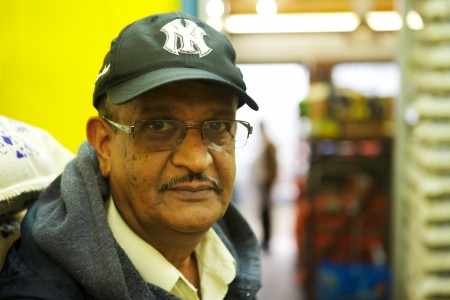 Naresh Khan: I came here from Kenya in 1972 when I was 16. We arrived in London on the 1st Nov and it was snowing… we had not seen snow, only on TV… it was cold; rain, snow… until about April. [To begin with] we were living in a rented place. At that time [no more than] 6 people were allowed to stay [in a house]. We were nine, five sisters and two brothers so we had to split… so a couple of us went to live with our cousin. In 1973 my dad bought a house in Palmers Green. I started work with a bank… then in 1980 I started a grocery shop in Turnpike Lane, the first one. At that time [few shops here were still owned by English people.]… there was a carpet shop, a car-mechanic garage and a couple of others… property-letting agents. But mostly they were Greek. They owned different businesses around here: grocery shops, off-licenses, Kebab shops, television repair shops, laundry. I think one or two Italians were also here, but I can’t recall them now. A lot of Irish people, builders, were also living here. This shop was a barber shop, not sure if they used the other rooms as sleeping rooms. They were Jewish. [The other shop] was a Turkish kebab shop… one of the oldest kebab shops in Turnpike Lane. His dad had been here since 1960. There were [also] Moslems in this area, but not in the Businesses, they started later. Two years after me, a butcher shop came. Gradually it built up, and people from Bangladesh and Pakistan started coming.
Naresh Khan: I came here from Kenya in 1972 when I was 16. We arrived in London on the 1st Nov and it was snowing… we had not seen snow, only on TV… it was cold; rain, snow… until about April. [To begin with] we were living in a rented place. At that time [no more than] 6 people were allowed to stay [in a house]. We were nine, five sisters and two brothers so we had to split… so a couple of us went to live with our cousin. In 1973 my dad bought a house in Palmers Green. I started work with a bank… then in 1980 I started a grocery shop in Turnpike Lane, the first one. At that time [few shops here were still owned by English people.]… there was a carpet shop, a car-mechanic garage and a couple of others… property-letting agents. But mostly they were Greek. They owned different businesses around here: grocery shops, off-licenses, Kebab shops, television repair shops, laundry. I think one or two Italians were also here, but I can’t recall them now. A lot of Irish people, builders, were also living here. This shop was a barber shop, not sure if they used the other rooms as sleeping rooms. They were Jewish. [The other shop] was a Turkish kebab shop… one of the oldest kebab shops in Turnpike Lane. His dad had been here since 1960. There were [also] Moslems in this area, but not in the Businesses, they started later. Two years after me, a butcher shop came. Gradually it built up, and people from Bangladesh and Pakistan started coming.
I’ve three children, a son and two daughters. My son is an IT consultant, my elder daughter is a pharmacist and my youngest a psychologist. I am proud! I looked after them, they look after me, that how it all built up. [They are proud of me]. London is changed. Now there is the freedom of everybody coming. Lot of people come from all parts of the world. Before you just had Asians and Greeks. Now we have Turkish, Polish, Bulgarian people opening businesses in Turnpike Lane. Before we did not have that many [eating] shops here, but now we have many.
Of course the changes are positive. But there are risks in business, because there is a lot of competition… it’s not like before. The supermarkets have taken a lot of the business – not only ethnic business – but also Polish, Jewish and Turkish business, they have everything in there now… [Another problem in Turnpike Lane] is parking… it costs 3 pounds an hour… people who want to buy a couple of things ignore coming here.
[During riots]… ten percent of people are going for it… the rest take advantage of being there. That can be overcome if there is a proper way of handling people by the police – sometimes the police is very rough on something which you have not even done – that will minimise problems we have with other ethnic or other communities… which now has cooled down, you know. [Also] education comes in here, parents are to keep an eye on the children, then the children will never get spoilt.
My dream at the moment, after retiring, is enjoying my life… to see the world, exercise, look and roam around. I would like the community to work hard, like we’ve done, establish themselves, and teach their children in proper manner… study properly, and once they have graduated, get jobs… and their parents can be looked after.
I have been back to Kenya 3 times, [but going back permanently] no. It is warm and nice [there], but the children are here… they were born and grew up here… they love this place.
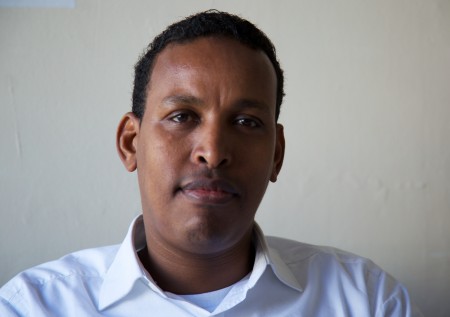 Nurelddin Mohammad: I am Nurelddin, a British citizen, I came to Britain in 2002. I am from South Central Somalia, lived in Kenya for 10 years before coming here, went to University, studied a degree in Politics and Sociology. I am the Managing Director of the Hope Community here. Started this centre in 2011… [to help] any migrant across the board… across ethnicity… People from Eastern Europe come to us for training… from East Africa, Arab Countries, everywhere. Everyone is coming to us. We are open to every ethnicity.
Nurelddin Mohammad: I am Nurelddin, a British citizen, I came to Britain in 2002. I am from South Central Somalia, lived in Kenya for 10 years before coming here, went to University, studied a degree in Politics and Sociology. I am the Managing Director of the Hope Community here. Started this centre in 2011… [to help] any migrant across the board… across ethnicity… People from Eastern Europe come to us for training… from East Africa, Arab Countries, everywhere. Everyone is coming to us. We are open to every ethnicity.
We provide training for people who want to go back to work and for people who want to get integrated by speaking English, knowing the culture of this country, and also people who want to apply for British Citizenship. We train people to meet standards required to become British Citizens. We provide career advice for people who want to acquire particular skills demanded in the workforce. We teach them how to sell themselves, preparing their CVs and interviews, discussing prospective jobs, career path.
I think everything is very hard for a newcomer. The culture is very hard, the food is very hard, the weather is very hard. Everything is hard. But some people are determined they can make ways to get through those difficult situations.
I came here after the riots – in Turnpike Lane the riots were not particularly bad, but it effected the whole community. There was fear and lack of security. So people sometimes left their doors shut for days, not opening their offices, but after a few months it went back to normal. Turnpike Lane is a diverse society. The word diversity, you will feel it when you come here. People come from all continents of the world. You will see Somali, Turkish, Iranian, Cypriot, Greek, East Europeans – specially Albanian people. You are in the middle of the world. Everyone is here. The diversity is absolutely very clear, and we enjoy that. Everyone respects you, they respect your culture. Every part of the Turnpike Lane is beautiful, absolutely wonderful. People are very open to each other. My friends are from many parts of the world. The diversity in this area is very beautiful and you feel like a flower. A colourful flower – you enjoy it – not one colour.
I enjoy different foods. In Africa I used to have only one type of food. When I came here I have choices – the food is amazing, Turkish, Indian, Cyprus food even the clothes. I have never come across any abuse. No one offended me in terms of race, colour or language. I did come across a case of a woman wearing Islamic clothes – she said ‘some people are targeting me, because of my appearance’.
I am married with 3 kids, 1 boy, 2 girls. My wife is financial graduate – she is a company executive. Somalia is not safe to take my children. Mostly we go for holiday to Kenya. I miss the weather and everything there. Everything is very natural. The industrial revolution never happened in Somalia. The river and the fish are fresh – and the Sun. Now every time I go to my GP, he says ‘your vitamin D is low again’! My people at home need [my experience] desperately, now that institutions are being built… they need someone to provide training for the system. I have kids and have to look after them, see them grow up, integrated in the society. I have to help my kids. If I leave them and go there, I am helping someone else, but not them. That does not make sense. I have to do both.
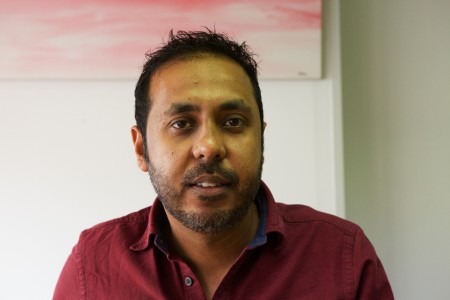 Sayed Habib: My name is Sayed Habib. I was born in Bangladesh, and came to UK at the age of two. I Currently live in Stratford. This is a new business, established 6 weeks ago. [I have known Turnpike Lane for a long time] I used to come here with my father when as a child… he used to bring me shopping here… We used to get our monthly shopping here… Another reason is that there is a large Asian community here… my business is primarily, 80% focused on Asian community… Also, my brother has a restaurant not very far from here, across the street, so it was convenient being next to him. I do not know the community yet …I am gradually building this up… People are coming… I am getting used to the community here…
Sayed Habib: My name is Sayed Habib. I was born in Bangladesh, and came to UK at the age of two. I Currently live in Stratford. This is a new business, established 6 weeks ago. [I have known Turnpike Lane for a long time] I used to come here with my father when as a child… he used to bring me shopping here… We used to get our monthly shopping here… Another reason is that there is a large Asian community here… my business is primarily, 80% focused on Asian community… Also, my brother has a restaurant not very far from here, across the street, so it was convenient being next to him. I do not know the community yet …I am gradually building this up… People are coming… I am getting used to the community here…
My mother and father come originally from Bangladesh… from Sylhet… I go back often. I try every year, but if I cannot manage that, definitely once every 2 years, for a quick break, one two weeks, maximum three weeks.
I have two children – 2 boys – one is 7 and one is 5, both born here. The oldest one has been to Bangladesh three times and the youngest twice. They love it there – the openness. Here you are confined to a flat. Maximum once a week my wife will take them to the park, whereas in Bangladesh it is open… the whole house is open… like a park. You walk out of the house and you have fields, everything is there for you… They are not confined to the flat.
When I was a child here I faced racism… my family faced racism… we didn’t feel safe to go outside on our own. If we had to go out, we used to go out in a group… never walked the street after dark on our own. Right now I believe it is a lot safer… I feel confident if my children are out with my wife at night… walking home. There is still racism out there, but it is not as open as it used to be, 15, 20 years ago. I do not believe my children have confronted any form of racism… They don’t know about racism though… They are Londoners… This is their home, they don’t have anything to worry about. [In my lifetime – I am 35] London has become more integrated. People have become more tolerant… you walk down the street you feel like you are a Londoner… you feel blended in now… Whereas back in those days you wouldn’t have felt confortable, you would not go to certain shops. You can go to every single shop now… certain areas you would not go to … you’d hang around in your community. Whereas now – I believe you can walk around anywhere in London and you feel [safe].
My dream is for my kids to be successful… to be established and to have a great carrier… me I am working hard to give them everything. My father was unable to provide so much for us… it was very difficult for him. Now life is becoming easier you know… we have opportunities… My father never had these opportunities… going out doing a business. He wouldn’t feel confortable doing it. But now my brother has a business, I’ve got a business, we feel more confortable.
Hopefully when the next generation… my kids, when they get older… they can go even further. They can go into the professions and be more confortable. In the past, one wouldn’t hear of a lot of Asian professionals. Now you have doctors, pharmacists, business owners, teachers. They are gradually integrating into professions as well. Yes, my father is very proud of me.
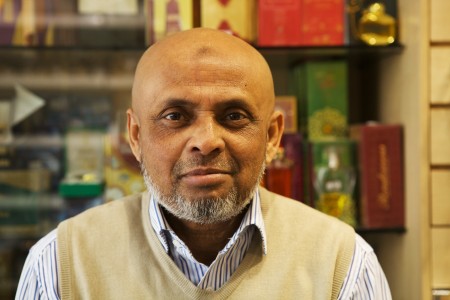 Shadeen (Niazur Chowdhury): I am from Bangladesh… Been here since 1993. Before coming here, after doing my higher studies,
Shadeen (Niazur Chowdhury): I am from Bangladesh… Been here since 1993. Before coming here, after doing my higher studies,
I was a college teacher… teaching political science to degree students… anyway, I came here… I was working in Imperial London Hotels Ltd as a room service waiter… Then I became a supervisor… I was working there from 1993-2002. Then I was ill and had to quit my job. I have been living in North London for 22 yrs. [When I came to the UK] I was very excited… my wife was living here… my father in–law came here in 1957… then my wife came here in 1980’s… we married in Bangladesh… she was working in the post office… I have a daughter working with a finance company… she graduated with a First Class degree from Royal Holloway University… She got a job straight away…
Turnpike Lane is a very nice place… we are living here together… Turkish, Pakistani, Bangladeshi people… everybody is very happy to work here… multicultural… Like we are working here as a family… we know each other… If anybody gets a problem we go to their shop… Specially in the Bangladeshi community… The Bangladeshi community is very united here… I think we’ve got 5 or 6 shops here.
Before, Turnpike Lane was really busy… and this shop was making very good business… After Sep 11 lots of things went wrong, recession came… and this whole street suffered… Everybody is struggling.
There was a big riot 5-6 years ago… they invested lots of money in Wood Green high street… Now it is pedestrianised… In Turnpike Lane, before, we could park here… then there were cameras and the shoppers got tickets… lot of people faced too many problems… Now this camera is finished… If the government does some regeneration… does some sidewalk developments… people will come here… Because there is a nice place over here.
[Do you ever think of going back permanently?] Well you know my wife, my daughter, everybody is here.[My daughter was] born here… I am happy to live in UK… very nice country and multicultural, specially… all different cultures. I go [to Bangladesh] every 2-3 years for holiday… a couple of weeks and we come back… we cannot forget our homeland… my relatives, my sisters, I go sometimes for holiday… My wife, my daughter, everybody is here. My daughter was born here… she is more English than me… [How does she like Sylhet] Yes, she went last December, but when they go … they don’t like it … rainy there… mosquitoes and lots of dust… We love our country… what is there… even mosquitoes… but they… they say how can you live like that?… she loves to go there for a while … we have to calculate the time… wintertime is good for us…
[Did you suffer from racism] No… education [is important]… 50-60 years ago it was different… Bangladeshi people, when they came they were not very educated… in the past maybe there were some cases… but now in the last 30 years… No, I think they did not face racism… No I did not face any racism.
My dream is to do some business here …
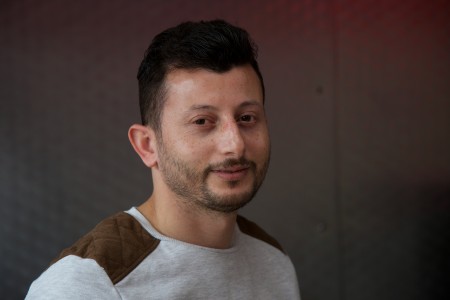 Waseem Shah: I am from Pakistan, been in England for 25 years. I live in East London. I have been working in Turnpike Lane for about 12 years. This is our family restaurant, Salim Restaurant. Been serving food since 1995. We are doing real good. We serve Asian, Pakistani (Punjabi) food. We’ve got so many costumers… some coming from far. Some of the families have been coming here for over 20 years… they keep coming back. We open 7 days a week, from noon to 11pm. I do not have many friends in Turnpike Lane, because I come here for work only… I have my friends where I live. When I come to work… I keep a distance from people… Because I do not have time for that… I know so few people.
Waseem Shah: I am from Pakistan, been in England for 25 years. I live in East London. I have been working in Turnpike Lane for about 12 years. This is our family restaurant, Salim Restaurant. Been serving food since 1995. We are doing real good. We serve Asian, Pakistani (Punjabi) food. We’ve got so many costumers… some coming from far. Some of the families have been coming here for over 20 years… they keep coming back. We open 7 days a week, from noon to 11pm. I do not have many friends in Turnpike Lane, because I come here for work only… I have my friends where I live. When I come to work… I keep a distance from people… Because I do not have time for that… I know so few people.
It’s been good working here… Over the last 12 years Turnpike Lane has really changed… it’s been improved …it’s become busier. The road has changed, the shops have changed… there are new businesses, a different – mixed – crowd. Now you have Turkish, Bengalis, Pakistanis, Mauritians…
There are also many foods here… you can get Mauritian food, Turkish food, Pakistani food, Bengali food… I don’t really try all those foods. I try different Turkish foods, all their grills…
I think they ought to open a Tesco here… because people go far to get to Tesco’s… You need a petrol pump nearby. We need more parking… for our business, for other people. This lane is quite busy now… with potential…
Ramadan we are quite busy, its good, but we don’t just have Moslem costumers… we have all different costumers… I’ll tell you one thing; before starting work here … I did not know many countries’ names… Now around the globe, whichever country exists, I know it… only because people have been coming here. I have all sorts of costumers, not just one nation comes here – we have Africans, Chinese, Mauritians, Bengalis, you name it… British… just any country.
And on top of it, they are all nice people. I have never seen any bad people. So what you see on the TV, on news or films… that’s just stories… but in reality… around the world they are all nice people … because I have seen it with my own eyes, and I have had experience, and I have talked to them… I have learnt many things in this business…
London is my home. I miss it when I go away. That’s why I come back… London is the place. Because I have been here so long, my family been here for so long, friends. It is our home here.
I have been to Pakistan a few times… but I just go to visit. I don’t mind going for 2 weeks and coming back… End of the day life is too busy… there are many things to do and you have to pay your bills… so you can’t have big holidays.
Pakistan is OK for holiday… [But to go and live there] No. There are so many other countries in the world… you can go live there… … Because everyone is here, I am here, my brother is here, they are married here, all the family is here… It is our home here.
My father has been here for a long time, since the 1960’s. If he goes back to Pakistan there is no one there… maybe he can see his cousins, uncles… but he has not seen them for so long…
Once you live in a place, and you have your family there … you make your friends there… it becomes your home it’s been a long time… he has been here 50, 60 years.
